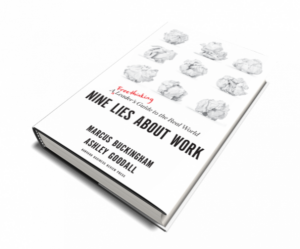
“9 Lies About Work: A Freethinking Leader’s Guide to the Real World” by Marcus Buckingham and Ashley Goodall challenges conventional wisdom in the workplace, offering refreshing insights for both leaders and employees. The authors debunk nine common misconceptions that hinder organizational success, promoting a more authentic and effective approach to work.
The first lie addressed is the belief that people need feedback. Buckingham and Goodall argue that feedback often focuses on weaknesses, leading to disengagement and demoralization. Instead, they propose a strength-based approach, emphasizing the importance of leveraging employees’ strengths to enhance performance and satisfaction.
The second lie challenges the notion that well-rounded individuals make the best employees. The authors advocate for a “two-loop” approach, where individuals develop excellence in specific areas rather than striving for mediocrity in everything. This approach aligns with the philosophy that unique strengths contribute more to success than a well-rounded skill set.
Lie number three confronts the idea that people can reliably rate other people. Buckingham and Goodall argue that traditional performance reviews are inherently flawed and subjective. They suggest a more objective evaluation system, emphasizing outcomes and impact over subjective opinions.
The fourth lie addresses the belief that people have potential. The authors contend that potential is unpredictable and context-dependent, urging organizations to focus on current performance and contributions rather than speculative future capabilities.
Lie five challenges the assumption that work-life balance is essential. Instead, Buckingham and Goodall propose a concept of “work-life blend,” acknowledging the intertwining of personal and professional life and advocating for a holistic approach that aligns with individual preferences and priorities.
Lie six questions the idea that leadership is a well-defined set of skills. The authors argue that effective leadership is context-specific and requires a tailored approach based on individual strengths and the needs of the team.
Lie number seven addresses the belief that great leaders are great coaches. While coaching is valuable, Buckingham and Goodall argue that effective leaders prioritize the strengths of their team members, fostering an environment where individuals can excel in their areas of expertise.
Lie eight challenges the assumption that people are loyal to companies. Instead, the authors advocate for a focus on reciprocal loyalty, where organizations invest in their employees, fostering a sense of commitment and engagement.
The final lie confronts the idea that the best organizations cascade goals. Buckingham and Goodall propose a more organic approach, where teams set their own goals based on their unique strengths and contributions.
In conclusion, “9 Lies About Work” offers a thought-provoking and practical guide to rethinking traditional workplace beliefs. By challenging these lies, the authors pave the way for a more authentic, strengths-based, and effective approach to leadership and teamwork. The book encourages leaders and employees to embrace individual strengths, foster a culture of collaboration, and create workplaces that prioritize engagement and excellence.
Cheers 🥂 MFR